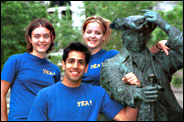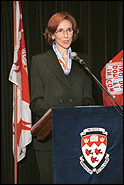on campus
of course
Nutrition: More than Canada's Food Guide
 PHOTO: Tzigane
PHOTO: Tzigane |
|
While dietetics and human nutrition professor Lynda Wykes makes sure her students have a good understanding of Canada's Food Guide and the basics of nutrient-related health and illness, what most interests her about teaching "Contemporary Nutrition" are the "amazing things [the students] think of. This is a most enlightening and inspiring course for me!"
What Wykes is referring to are the claims made in the popular media about particular nutrients, diets or illnesses that the students, largely from the Faculty of Arts, will critique for extra marks.
One psychology major, for instance, evaluated two weight-loss products advertised in Psychology Today. Not only did she debunk both ads for their lack of scientific explanation of the dramatic weight loss reported, but, in a letter to the editor, she also questioned the magazine for giving credibility to the companies.
"I am both surprised and disappointed that Psychology Today routinely publishes advertisements for revolutionary weight loss products, the efficacy of which is doubtful and over the safety of which serious concerns might be raised," she wrote.
Another student examined the claims of six types of eggs, including the "Omega 3" and the "Vegetarian Multigrain," all produced by the same company and all with varying amounts of nutrients and saturated (bad) and polyunsaturated (good) fats. Ultimately, the student concluded that, while nutrients and cholesterol levels might vary slightly, "with eggs, there must always be a trade-off, whereby the consumer needs to balance the benefits of high protein and a good source of vitamins and minerals against considerable levels of fat and cholesterol."
Wykes says that one of her goals "is to get across that there is no totally good or totally bad food." She also wants her students to have an appreciation of the difficulties of doing research in nutrition.
Last week, for instance, while teaching on iron-deficiency anemia, she asked her 80 or so students why researchers hadn't looked at the effect on children who are developmentally delayed due to anemia when one group is administered an iron supplement and the other not. Finally, she recounted, after using that example many times in her teaching, someone answered: "You can't do that; that's unethical!" Researchers can't deny treatment to sick people.
One of the common misconceptions students have, says Wykes, is that fats are bad because they cause cholesterol. English and cultural studies major Lea Kosatsky was surprised to learn that 30% of our daily calories should come from fats and only 12% from protein. "We learned that the body makes its own cholesterol and we just need to choose better-quality fats, such as olive oil and flaxseed oil."
Jennifer Cohen, a psychology student and vegetarian, finds the course useful in clearing up some concerns she had about getting enough calcium and vitamin D. "I found out that tofu is a good source of calcium," she said. "This course allows me not to have to depend on the mass media to tell me what we should eat."
YEA! to youth
 YEA! team members: Amelia Smith, Ketav Patel and Stephanie Axmann
YEA! team members: Amelia Smith, Ketav Patel and Stephanie AxmannPHOTO: credit |
|
Think Summit of the Americas and think student protest. But not for Stephanie Axmann, Leah Heenan, Amelia Smith, Laen Herschler, Suzanne Pude and Ketav Patel, all students in economics professor Myron Frankman's course "Economic Development."
Rather than reiterate the negative side of globalization, the students decided for their group project to write an action plan involving the youth of the Americas in the development of the two continents and won $1,000 for their effort.
In YEA! Youth in the Economy of the Americas, the students urge promoting "awareness among North American youth of how many of our everyday actions and decisions affect others involved in free trade relations amongst the Americas."
This could be done via the Internet and by holding annual Youth of the Americas meetings.
"We feel strongly that communication will allow a free flow of understanding to accompany the ever-increasing free flow of capital," they write, listing in the appendix the names of youth organizations and youth-oriented corporations, such as Nike and The Gap, operating in Latin America. The authors suggest the firms as possible donors to YEA! meetings and further suggest that universities in the richer countries donate their computer cast-offs to help create Internet cafés.
But the group envisages more than friendship and cultural exchange. They would, for instance, invite corporations to their meetings to talk about economic development and justice.
The idea to write the YEA! plan came from the Opportunities in the Americas Challenge, a contest for post-secondary students sponsored by the Canadian Foundation for Economic Education and the Export Development Corporation. The McGill team came first in Quebec and third in the country, bringing them some cash and an invitation to the Conférence de Montréal, held just before the Summit of the Americas.
At that conference, Axmann, before an audience which included Mexican president Vincente Fox, presented a short version of their paper and was thrilled to find her name on the guest list just ahead of former minister of foreign affairs Lloyd Axworthy.
Ironically, she notes, her friends were protesting globalization outside the conference centre while she was inside participating. "Protest is important," Axmann says, "but I think this is a better way: to be somewhere where you can actually make change."
The gift of Mahler
 Diane Wilhelmy
Diane WilhelmyPHOTO: Owen Egan |
|
McGill's Faculty of Music has had the good fortune of receiving one of the most important collections of recordings of the music of Gustav Mahler (1860-1911). Last month, Diane Wilhelmy presented the faculty with the 3,630 volumes of long-playing records collected by her late husband, Noël Vallerand (1937-1985), as well as the numerous articles he penned on the German composer.
What prompted Wilhelmy to make the gift to McGill was not an academic connection to the University; her husband was a graduate of the Université de Montréal and taught the economic history of New France and Quebec at the Université du Québec à Montréal before becoming deputy minister of cultural affairs and general manager of the Orchestre symphonique de Québec. Rather, the connection between Vallerand and the Faculty of Music has to do with a mutual love of Mahler, who gave the world such large and complicated works as the Symphony of a Thousand and the Symphony No. 5.
McGill, said Wilhelmy, "is the ideal location to promote a collection of universal value and to stimulate the studies and research that will enrich it continuously."
The McGill Symphony Orchestra has been playing Mahler for the past 13 years, an unusual undertaking for a university orchestra -- so unusual, and the results so acclaimed, in fact, that three years ago, Vancouver film producer Robert Chesterman made the film McGill, Mahler and Montreal. The orchestra has also made a recording of Mahler's Fifth, available on the Phonovox label.
Vallerand's collection of largely 19th century composers includes 302 volumes (491 discs) of Mahler, including all the major interpretations of the composer's works, "some of which are quite rare," said Cynthia Leive, head of the Marvin Duchow Music Library. Leive lauded the gift of the Noël Vallerand Sound Recording Collection as "an invaluable resource for the study of Mahler performance from the first recordings until 1985... It will be of great interest to musicians and scholars both locally and internationally."
To peruse the works in the collection visit: music.library.mcgill.ca/vallerand.htm
Feindel Chair Inaugurated
 Cynthia Baxter and Dr. David Kaplan
Cynthia Baxter and Dr. David KaplanPHOTO: Normand Blouin |
|
The William Feindel Chair in Neuro-Oncology may have been named after a single man, but at the inauguration of the chair last month, the event was clearly a celebration of the work of three men.
Dr. Feindel himself is a professor of neurology and neurosurgery and director emeritus of the Montreal Neurological Institute, where he was director from 1972 to 1984. He was the surgeon who treated Clive Baxter, after whom was named the Clive Baxter Memorial Endowment Research Fund, which endows the new chair.
Baxter was a 42-year-old award-winning journalist with The Financial Post in 1973 when he was diagnosed with a brain tumour. During his seven-year battle with the disease, he took it upon himself to write about the value of brain imaging for detecting tumours and the need for research to improve treatment. Baxter wrote, for instance, on how it was only thanks to the CAT scanner at the MNI -- the first in Canada -- that his tumour, which had gone undiagnosed for four years in Ottawa, was finally diagnosed.
Cynthia Baxter, Baxter's widow, and her three sons set up the endowment fund in 1980 in order to honour Baxter's memory and his belief in the work of the MNI. Addressing the full house in the Jeanne Timmins Amphitheatre of the institute, she recalled her initial reaction when her husband told her of his plans to write about his experience of having a brain tumour. "How public and how awful," she recalled thinking at the time. "But he did write about it. It was important for him and the Neuro."
The fund, now valued at $2.7 million, has, in fact, been supporting the work done at the MNI's Brain Tumour Research Centre since its beginnings in 1999 and contributes to the salary of Dr. David Kaplan, research director of the BTRC and first recipient of the new chair.
Upon unveiling the Feindel Chair, Kaplan thanked Cynthia Baxter, noting that even though brain tumours are the second cause of cancer death in Canadian children and third among young adults, they are largely understudied internationally.
"In creating the chair, Mrs. Baxter and her family wished to honour the dedication of Dr. William Feindel in treating brain tumour patients at the MNI, while at the same time providing the means for researchers to study and treat this devastating disease."

